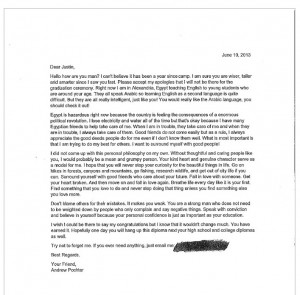Andrew Pochter, 21 Years Old, RIP
My heart hurts reading the inspiring letter the late Andrew Pochter sent to a boy he'd mentored before going to Egypt http://t.co/y4hU7VLpdC
— Philip Turner (@philipsturner) July 13, 2013
Further to my last tweet: Pochter, 21, was stabbed to death in Egypt where he'd gone to teach English to young people there. Very sad story.
— Philip Turner (@philipsturner) July 13, 2013
Amid the sadness over the murder of one young man, Trayvon Martin, I’ve also been terribly saddened by the violent death of another young man, Andrew Pochter, who went to Egypt to try and do some good. Reporter Karen Tumulty chronicled the story in the Washington Post:
“Andrew Pochter, a 21-year-old Kenyon College student from Chevy Chase, Md., was stabbed to death on June 28 during anti-government protests in Alexandria, Egypt. Pochter, a bystander to the demonstrations, was in Alexandria on an internship for a non-profit organization to teach English to Egyptian 7- and 8-year-olds. His family said the young man ‘went to Egypt because he cared profoundly about the Middle East. He had studied in the region, loved the culture, and planned to live and work there in the pursuit of peace and understanding.’
Pochter’s compassion and his determination to make a difference had begun much closer to home. For most of the past five summers, starting when he was 16, he had volunteered as a counselor for a program called Camp Opportunity. It is a weeklong sleepaway camp for at-risk children, aged 6 to 12, from the Baltimore area.
Each camper is assigned his own counselor, and the relationship continues each year. In June, Andrew Pochter’s camper had turned 12, and was moving on from the program. Unable to attend the ‘graduation’ picnic, Pochter sent the child a letter—one that summed up the way he was living his own life, and what he hoped to have passed along. It was read by Andrew’s sister Emily at Pochter’s funeral on Friday (text of Pochter’s letter is below):”

